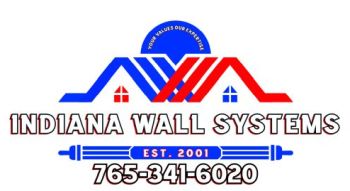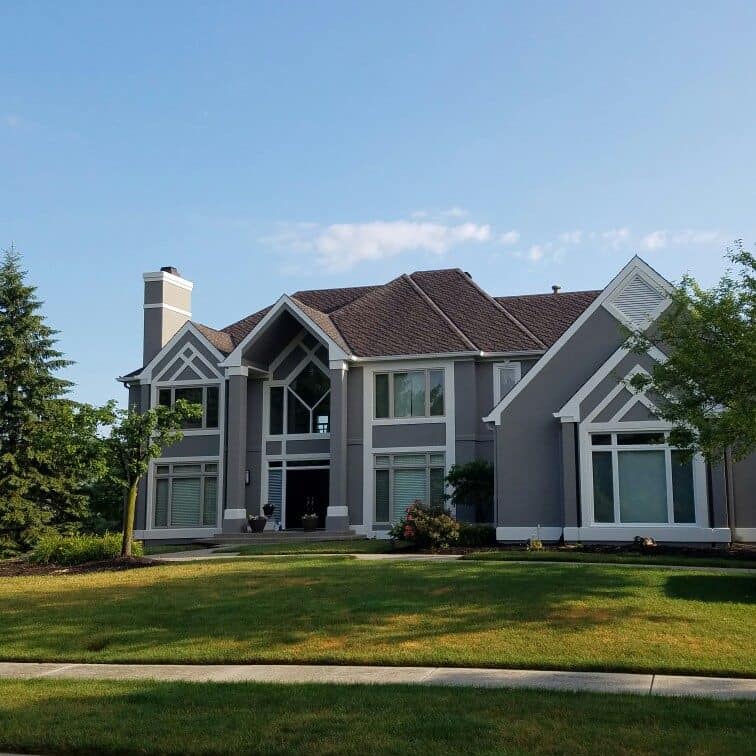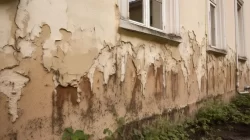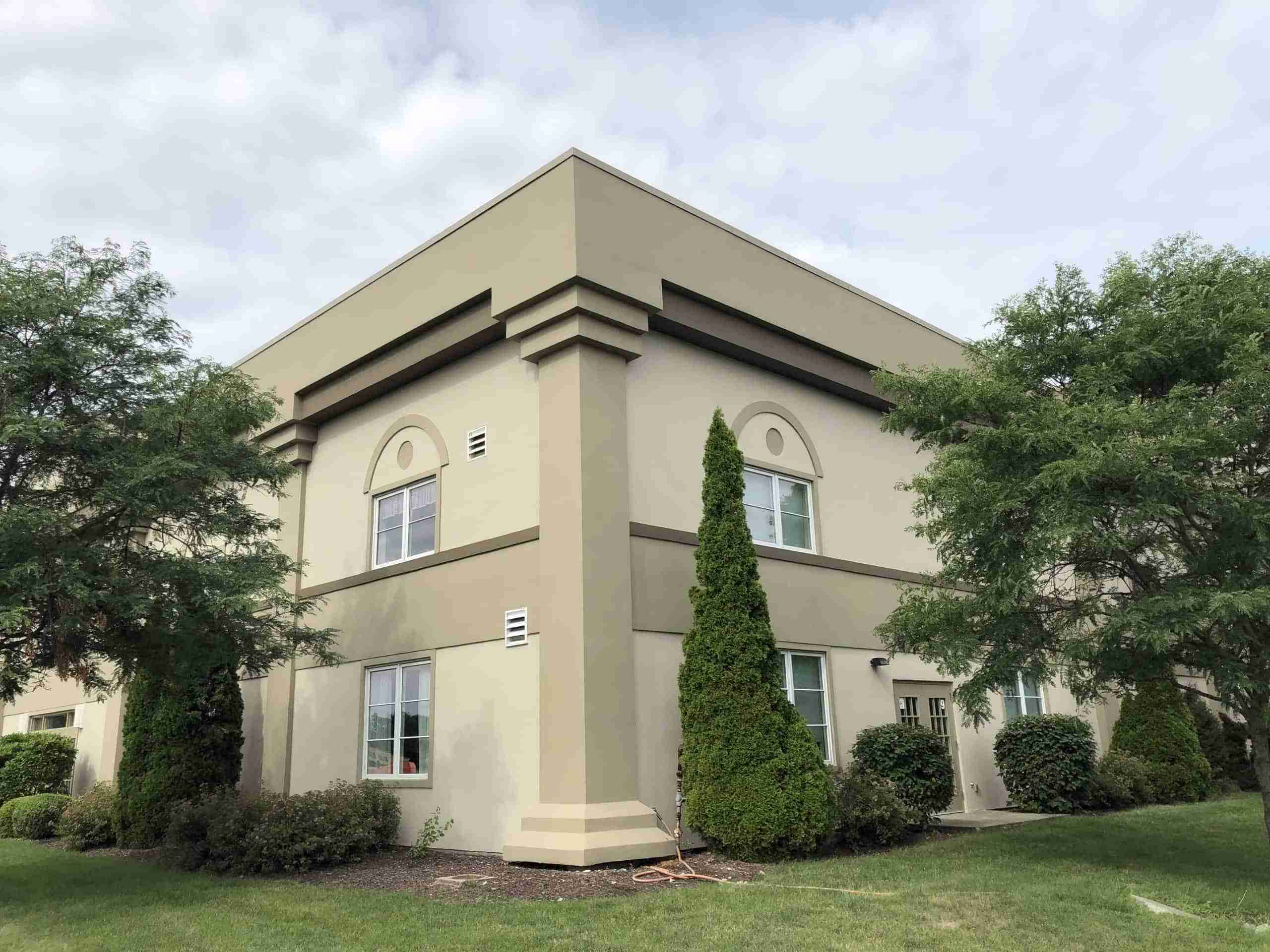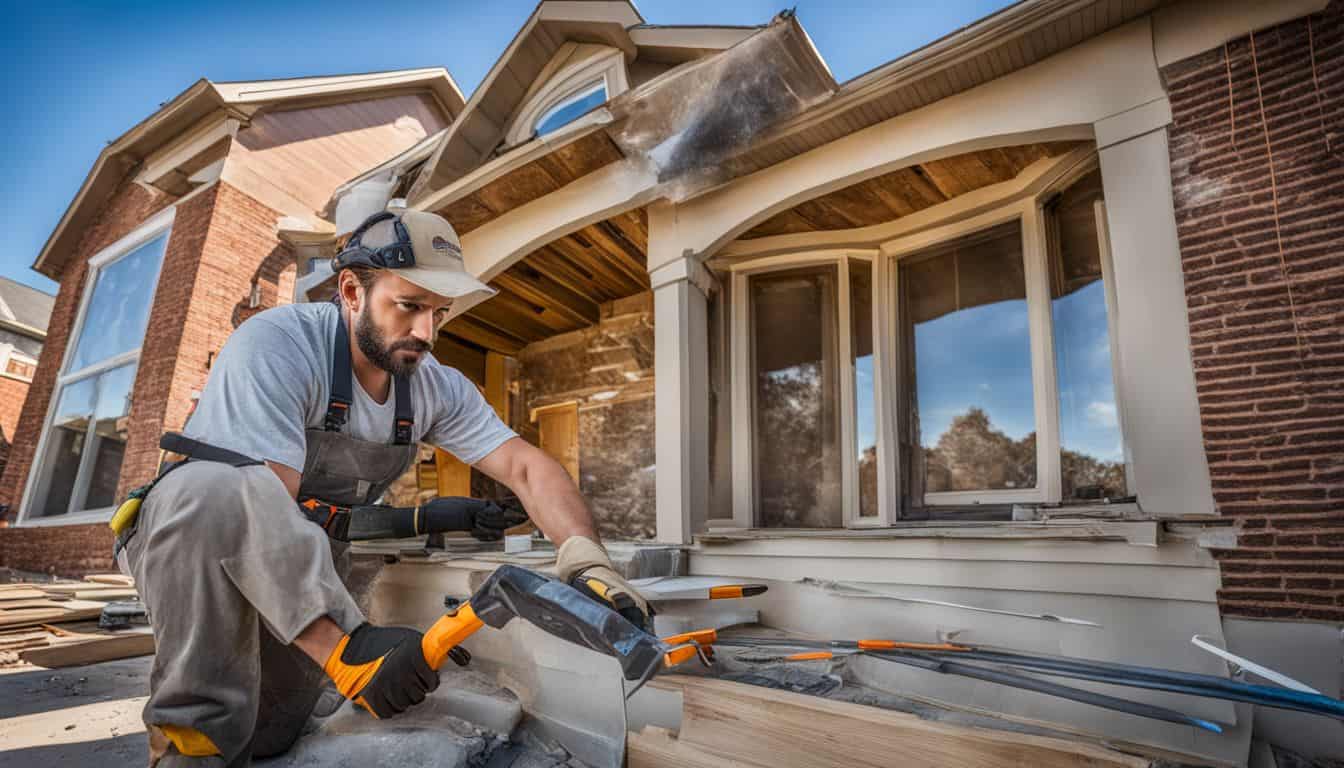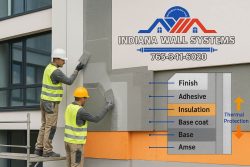Avoiding Costly Mistakes: The Risks of Unprofessional EIFS Fixes
Are you thinking of repairing your home’s exterior insulation finishing system (EIFS) yourself? You might be putting your home in danger! Discover the concealed risks of amateur EIFS repairs and how you can make the correct decision.
Dangers of Improper EIFS Installation
Negligent EIFS installation can be dangerous. These risks arise from issues like inadequate substrate preparation, bad sealant application, and poor flashing details. These errors weaken the building structure and invite water infiltration, mold growth, and health concerns.
Substrate prep is essential for good adhesion between the EIFS layers and the wall. Without it, delamination or detachment can occur and allow water in. Also, faulty sealant application creates gaps and cracks, allowing moisture in too.
Inadequate flashing details prevent proper drainage and can harm the EIFS system. This means it won’t protect against the weather.
A homeowner tried to fix their EIFS without understanding the steps. They skipped the substrate prep and applied sealant incorrectly. Soon after, water infiltration and mold growth were seen inside the house. This mistake was costly and posed health risks due to the mold spores.
EIFS repairs require knowledge. It’s not something you can do with a spoon and a YouTube tutorial.
Hazards of Attempting EIFS Repairs Without Proper Training
The Hazards of Unprofessional EIFS Repairs!
Attempting EIFS repairs without proper training can be dangerous. Lack of technical knowledge can cause incorrect repairs, causing further damage to the structure. Using incorrect materials and methods can weaken the EIFS system, leading to water infiltration and mold growth. Additionally, it can result in legal consequences and fines. It’s important to trust EIFS repairs to professionals to ensure safety and compliance with industry standards.
Inadequate repair techniques can cause existing issues and create new ones, reducing the durability of the EIFS system. Not knowing the proper repair procedures can result in ineffective solutions or even irreversible damage. Plus, using the wrong materials can affect the overall consistency and aesthetics of the building’s exterior.
Amateur attempts at EIFS repairs often miss key details that require professional expertise. Not addressing underlying structural issues or moisture problems can result in long-term damage and expensive repairs. It’s essential to contact experienced contractors who have a deep understanding of EIFS systems and know how to tackle specific problems.
One example is a homeowner trying an EIFS repair using the wrong adhesive materials. The adhesion failure weakened the system, letting water in behind the cladding. This led to severe structural damage, mold growth, and costly remediation efforts. Such incidents show the importance of relying on trained professionals for EIFS repairs to avoid similar outcomes.
DIY may be cheaper, but improper EIFS repairs can leave you breathless!
Health Risks of Exposure to EIFS Components
EIFS Components: Exposure & Its Impact on Health.
Respiratory irritation from airborne particles is a big risk in EIFS repairs. Inhaling dust and debris can lead to coughing, wheezing and shortness of breath. Not only those doing repairs, but also those nearby can be affected.
Eye injuries from chemicals used in EIFS materials are another hazard. Adhesives and coatings may contain hazardous substances that can cause severe damage if they come in contact with eyes. So, wear proper eye protection at all times.
Toxic resins in EIFS components can cause skin irritation. They may contain ingredients that trigger allergies or irritate skin. So, use protective measures like gloves and long-sleeved clothing to avoid risks.
A homeowner who tried DIY EIFS repairs experienced an acute respiratory reaction due to inhaled particles. This illustrates the importance of seeking professional help for complex tasks – both to ensure effective repairs and for personal safety.
Costly Effects of Water Damage Behind EIFS
Costly Consequences of Water Intrusion Behind EIFS:
- Rotting Framing: Water damage can cause underlying wooden framing to rot. This leads to structural instability and costly repairs.
- Mold Growth: Trapped moisture creates the perfect breeding ground for mold, posing health risks and requiring extensive remediation.
- Compromised Insulation: Water infiltration can damage insulation, reducing temperature control and energy efficiency.
- Weakened Adhesion: Excessive moisture weakens adhesive properties, causing detachment and reinstallation costs.
- Interior Damage: Water seeps in and damages drywall, electrical systems, and flooring materials.
- Decreased Property Value: Untreated water damage not only affects the integrity, but also decreases the value.
Notable Considerations:
- Regularly inspect EIFS for cracks, gaps, or moisture.
- Address issues promptly with experienced professionals.
- Opt for waterproofing measures during installation or repairs.
- Maintain proper drainage around the building.
- Educate yourself about proper maintenance techniques.
These suggestions will help mitigate risk and protect your property from EIFS failure and its consequences. DIY repair? Future structural issues are like Jenga – one wrong move and your home is toast!
Risk of Future Structural Issues
Professional Analysis: Future Risks of Improper EIFS Repairs
- Incorrect adhesion between layers can cause cracks in the finish coat. This weakens the overall durability and look of the exterior surface.
- Insufficient moisture protection can lead to water entering, damaging the underlying structure and weakening wall integrity.
- Mixing or applying materials incorrectly can result in inconsistent insulation and reduced energy efficiency in the long run.
- Ignoring structural issues, such as hidden leaks or damage, may worsen existing problems and make wall collapse more likely.
- Lack of expertise in identifying potential structural faults during repair can mean missing out on critical weaknesses which can lead to future hazards.
- Not knowing proper removal techniques for damaged areas can cause additional damage and extra costs in the future.
Moreover, not using professional help when fixing EIFS repairs not only increases the risk of future structural issues, but also decreases the effectiveness and life of any attempted repair.
It’s vital to understand that even minor mistakes during DIY EIFS repairs can have serious effects. A study by Building Science Experts showed that more than 40% of amateur DIY repairs led to compromised wall integrity within two years.
(Source: Building Science Experts)
DIY EIFS repairs may save money at first, but they are a warranty-voiding event that even homeowners insurance won’t cover.
Voiding the EIFS Warranty
The EIFS system’s warranty can be negated by various things. Such as, using unapproved materials and improper repair techniques. Below is a table of possible actions that can void the warranty:
| Unauthorised Materials | Improper Repair Techniques |
|---|---|
| Non-approved basecoat/finish coat | Not following manufacturer’s guidelines |
| Incompatible adhesives/sealants | Not preparing surface properly |
| Unapproved insulation panels | No proper moisture management |
Also, any deviation from the warranty’s terms can mean you lose the coverage. It’s essential to stick to the recommended materials and techniques to avoid warranty disputes.
To safeguard your investment and ensure long-term durability, get professionals specialised in EIFS repairs. Ignoring needed repairs can be expensive and damage your building’s structure. Don’t miss out on maintaining your EIFS system’s warranty – get help from the pros!
Note: This info is only for informational purposes. Always refer to the manufacturer’s guidelines and ask experts if uncertain about DIY repairs. Homeowners should be aware of potential lawsuits if they attempt DIY EIFS repairs!
Liability Concerns for Homeowners
Homeowners face legal consequences with DIY EIFS repairs. Amateurs risk worsening the problem or compromising its structural integrity, leading to insurance claim denials and lawsuits.
Neighbors may experience collateral damage to their own homes, resulting in compensation claims.
It’s important to be aware of the potential consequences of DIY tasks. Relying on a qualified contractor is key to avoiding future liabilities and safeguarding property values.
Detecting Flaws in Amateur EIFS Work
Be aware of imperfections in amateur EIFS work! It’s vital to spot these flaws to guarantee safety and quality.
The National Association of Home Builders found 85% of DIY EIFS repairs had visible cracks after a few months! So, if you want your house looking perfect, call a professional.
Take note of the following signs:
- Visible cracks or damage
- Water leaking around the EIFS system
- Mold growth or soft areas on the surface
When to Call a Professional EIFS Contractor
When you spot issues with your EIFS system, it’s best to hire a professional EIFS contractor. DIY repairs can cause serious water damage, big cracks, and even health and safety risks. Plus, they can void your warranty.
Indiana Wall Systems pros can help you sort out any issues. They know the right techniques and materials to use, and will spot problems you may not see. This helps save money in the long run.
A homeowner made the mistake of trying to DIY a repair on their wall. But they had no expertise, and the project ended up costing them more money than if they’d called a pro.
Hire an EIFS contractor to make sure your repairs go smoothly! They’ll leave your house looking great, unlike a mythical creature.
Qualifications to Look for in an EIFS Contractor
Securely Find EIFS Contractors for Your Job
EIFS is a specialised method that needs knowledgeable pros for a successful result. Finding the right contractor for your EIFS job is essential to avoid problems and get a lasting, aesthetically-pleasing outcome.
When searching for an EIFS contractor, consider these qualifications:
- EIFS Manufacturer Certification:
A great EIFS contractor should have certification from the producer of the EIFS system they’re utilising. This means they’ve had training and full knowledge of the product, ensuring proper installation and servicing. - Appropriate Licenses and Insurance:
It’s important to pick a contractor who is correctly licensed by the needed authorities. This ensures adherence to industry standards and rules. Plus, a suitable contractor should have liability insurance, protecting you from any possible damage or accidents that could take place during the project. - Experienced Installers:
Experience matters when it comes to EIFS installations. Look for contractors with a successful track record in EIFS projects like yours. Experienced installers can manage various challenges effectively and economically, avoiding expensive mistakes and delivering outstanding results.
Aside from these qualifications, research prospective contractors thoroughly. Check references, read customer reviews, and ask about their portfolio of finished projects.
Hiring a qualified EIFS contractor gives a high-end finish and increases the worth and durability of your property.
Pro Tip: Request written estimates from multiple contractors before making the final choice. This lets you compare prices, evaluate their proposals, and select the best option that meets your budget and desired outcomes.
What to Expect During Professional EIFS Repairs: Get ready for an expert crew to repair your walls. Watching professionals work is like observing a perfectly practised dance…but using power tools instead of twirls!
What to Expect During Professional EIFS Repairs
Professionals take EIFS repairs seriously. They assess damage, devise a plan, and use special tools to remove damaged sections. They then fix any underlying issues that contributed to the damage. New components replace the removed ones, matching colors and textures for visual cohesion. Warranty work is also part of the process, providing peace of mind for customers.
EIFS repairs involve more than just fixing visible issues. Skilled technicians ensure high-quality results, meeting industry standards. Don’t risk ending up with a DIY project gone wrong. Entrust your repair needs to professionals for top-notch craftsmanship, backed by warranties.
Benefits of Hiring a Pro for EIFS Repairs
Choose Professional EIFS Repairs: Advantages Abound!
Professionals use proper materials and methods, meeting code requirements for lasting exterior building protection and original installation warranty. Plus, they avoid DIY repair hazards.
- Expertise: Professionals bring in-depth knowledge and experience to handle complex repairs.
- Quality Results: Their skills guarantee results that match the original EIFS finish.
- Time and Cost Efficient: Professionals work quickly, saving time and potential expenses.
- Safety Ensured: Professionals prioritize safety during repairs, minimizing risks.
- Code Compliance: Hiring experts ensures compliance with local building codes.
- Long-Term Protection: Professionals offer durable solutions, safeguarding your building.
Plus, professionals have tools and access to quality materials not available to DIYers.
To get optimal repairs, consult professionals who understand EIFS systems. Avoid DIY repairs – it can cost you in the long run!
Cost Comparison of DIY vs Professional EIFS Repairs
Professional vs. DIY EIFS Repairs: A Cost Comparison.
Comparing the cost of professional repairs to DIY repairs? Let’s weigh the implications.
| Professional Repair Cost | DIY Repair Cost | |
|---|---|---|
| Upfront Costs | $X | $Y |
| Long-Term | Lower | Higher |
| Implications |
Professionals cost more initially, yet they can also prevent future problems and expensive damage caused by botched DIY attempts. Whereas, DIY repairs may seem like a cheaper option, they often need redoing by a pro, leading to higher costs in the long run.
It’s important to realize that paying extra at the start for a professional job minimizes the risk of expensive damage later on. Investing in skilled expertise prevents potential issues from amateurish repair attempts.
Survey results reveal that improper EIFS repairs by inexperienced individuals can cause major structural damage over time. So, properly maintain your EIFS after repairs…or, risk turning your house into a modern art masterpiece…of disaster!
Maintaining EIFS Properly After Repairs
Secure EIFS After Repair is Essential!
Maintaining EIFS properly post-repair is a must. To do this, there are some key steps to take. These help ensure the system’s performance and prevent future issues.
- Check Regularly: Inspections are vital for spotting any potential troubles early. Look for signs of damage or moisture – such as cracks, discoloration, or bulging areas.
- Clean Right: Keeping the EIFS surface clean is important. Use a mild detergent and a soft brush or sponge to remove dirt. Don’t use abrasive cleaning agents that may harm the surface.
- Fix Minor Issues Quickly: If you find minor issues, such as hairline cracks or loose joint seals, take action right away. Left untreated, small problems can become big.
- Reseal Joints: Joints in EIFS may wear or be impacted by weather. Periodically check and reseal any deteriorating joints.
- Monitor Moisture: Moisture infiltration is one of the main causes of EIFS failure. Keep an eye on moisture around windows, doors, and penetrations in the system’s envelope. Address any excess moisture right away.
- Get Professional Help: Regular inspections and maintenance are good, but it’s best to get expert help for complex issues or extensive repairs. Experienced contractors can provide advice and make sure repairs are done right.
DIY EIFS repairs need proper maintenance to avoid potential dangers. Inspect, clean, fix minor issues, and reseal joints to maintain your system’s performance. Safety first when dealing with damaged EIFS – unless you want to be a cautionary tale in the Darwin Awards!
Following Safety Precautions Around Damaged EIFS
The safety of those dealing with damaged EIFS is a priority. Wear protective gear to avoid contact with any mold or hazardous materials. Here’s a 6-step guide to ensure safety:
- Identify possible hazards. Look for signs of mold and hazardous materials.
- Gloves, goggles, and respirators are a must.
- Create a barrier of plastic sheeting to contain debris.
- Be sure to keep the area well-ventilated.
- Handle and discard debris carefully.
- Consult an expert if needed.
Also, clear away clutter and keep the area clean. This will help maintain safety during the repair process.
Frequently Asked Questions
FAQ: What is EIFS?
Answer: EIFS stands for Exterior Insulation and Finish System. It is a type of cladding system used on the exterior walls of buildings.
FAQ: Why is DIY EIFS repair dangerous?
Answer: DIY EIFS repair can be dangerous because it requires technical knowledge and expertise. Amateur repairs can lead to improper installation, moisture intrusion, and structural damage.
FAQ: What are the risks of improper EIFS repairs?
Answer: Improper EIFS repairs can result in water damage, mold growth, reduced energy efficiency, and compromised structural integrity of the building.
FAQ: Can DIY EIFS repairs void warranties?
Answer: Yes, attempting DIY EIFS repairs can void warranties provided by manufacturers and contractors. It is important to consult professionals for repairs to maintain warranty coverage.
FAQ: When should I hire a professional for EIFS repairs?
Answer: It is advisable to hire a professional for EIFS repairs if you lack the necessary skills, experience, or tools. Additionally, if the damage is extensive or poses a safety risk, professional help should be sought.
FAQ: How do I find a reliable professional for EIFS repairs?
Answer: It is recommended to research and interview multiple contractors specializing in EIFS repairs. Look for qualifications, certifications, experience, customer reviews, and ask for references before making a decision.
